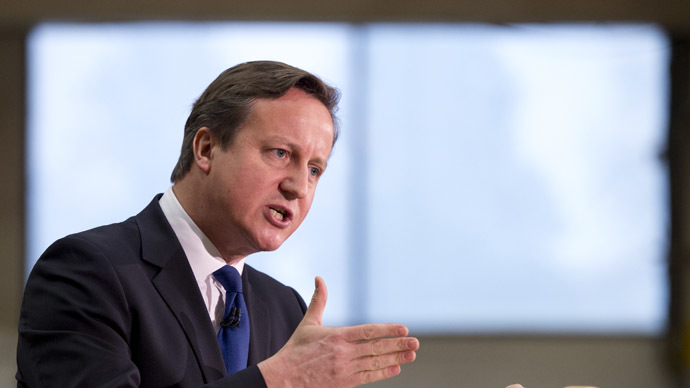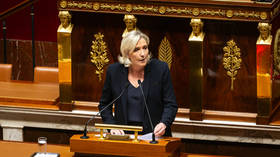UK freedoms at risk as govt security report gives PM support for tougher measures

UK Prime Minister David Cameron’s plan to whip up support for new security proposals has been ramped up by the UK parliamentary Intelligence and Security Committee (ISC) report into 'intelligence' related to the murder of soldier Lee Rigby.
On Tuesday morning, the committee presented the findings of their investigation to parliament.
Controversially, they said the death of Fusilier Lee Rigby could not have been prevented, and that social media giant Facebook should have been more effective in highlighting the exchange between Rigby's murderers which they conducted using the service.
Human rights groups including Liberty have claimed the ISC have shifted blame and responsibility for Rigby's murder onto internet companies, in this case Facebook.
The backdrop to the report is a timeline of announcements made by the Conservative government in recent weeks seeking a majority at the next general election in May, and as a result, they unveiled a number of initiatives supposedly aimed at tightening a grip on extremist activity.
The government claims the new measures, and the unveiling of new anti-terror policies this week by Home Secretary Theresa May, is not a “knee jerk reaction” to the perceived threat of ISIS.
If not, they are certainly following a trend which is seen throughout Europe. But with David Cameron recently raising the terror threat in the UK (with opposition to the move from the Liberal Democrats), there is a danger that among the heightened hysteria over the so-called Islamic State, new powers brought in by the UK government risk damaging existing freedoms, rather than protecting the liberty of the vast majority.
Given the very recent revelations over GCHQ, the surveillance of millions of innocent people, the abuse and stigmatization of whistle-blowers, and the UK government's own record of supporting terror groups in the Middle East, concern over the sincerity and objectives of David Cameron's new plan is justified.
There is also concern that while Cameron's initiative, backed wholeheartedly by Theresa May, claim to target extremism, the definition is broad and could end up being used to target legitimate political dissent from activists and journalists.

Civil liberties watchdogs and human rights groups have condemned the proposals, along with government plans to pressure social media companies to fall in line with the new measures, claiming that such gestures, risk backfiring.
The government's new security measures are accompanied by recently outlined proposal to introduce powers to seize the passports of those Britons returning to and leaving the country, who are suspected of working with extremist groups. Presumably this will include those working with the extremist groups supported and funded by the West.
The threat of ISIS is no doubt real; a creation of the West to invite further military “intervention” but Cameron has claimed they are the greatest threat to the UK in recent times.
But we're being asked to trust a new set of measures and laws, introduced by the same power brokers who have misused power for years. We're being asked to trust the same institutions of governance and “intelligence” that have led us into the problems we face in the first place.
The fact the Liberal Democrats opposed Cameron's decision to raise the terror threat level, which is a justification for tighter security is interesting.It's almost as if the terror threat was raised by Cameron to justify his new measures which otherwise might seem quite drastic.It's almost as if Cameron calling ISIS the “greatest threat to the British people” is to distract from the fact that his own government is the currently the biggest threat to the welfare of the British people.
David Cameron, who not too long ago dismissed UKIP, now finds himself posturing to the right in a bid to win back voters he has lost to them.With his words and speeches on terror and immigration increasingly resembling the far-right this week the British people ought to be concerned.
Have these moves been effective in this past?The justification being echoed throughout the media today is that these moves and similar moves throughout Europe are being done in the name of protecting citizens and keeping our streets safe, and by punishing those who would join groups hell bent on destruction.
Why then do the British government and the West in general create precisely the right conditions for groups like Isis to flourish?Surely this is the bigger issue which needs addressing.
The reason there is currently a sectarian bloodbath in the Middle East, which is the basis of these measures which are being brought in, is because the West continues to fund and support death squads in the region.
But surely, draining ISIS of support would be more effective in breaking the allure they have on impressionable people, rather than curtailing the freedoms of the vast majority of innocents?
Should the Conservatives win the election in May, their new counter-terrorism will be first on the agenda, and they are busy selling it now.It's likely that opposition to this bill will continue, their media all the time churning out the same narrative.The greatest threats to our freedoms are governments.The greatest source of terrorism in the World is state sponsored terrorism.Of course terrorism in the media only ever seems to be called out by the mainstream media when its brown men with beards involved.But we must be vigilant and recognize that the laws and scaremongering now commonplace in the media and being taken up by politicians is in reality the biggest obstacle we collectively face.
The statements, views and opinions expressed in this column are solely those of the author and do not necessarily represent those of RT.
The statements, views and opinions expressed in this column are solely those of the author and do not necessarily represent those of RT.













